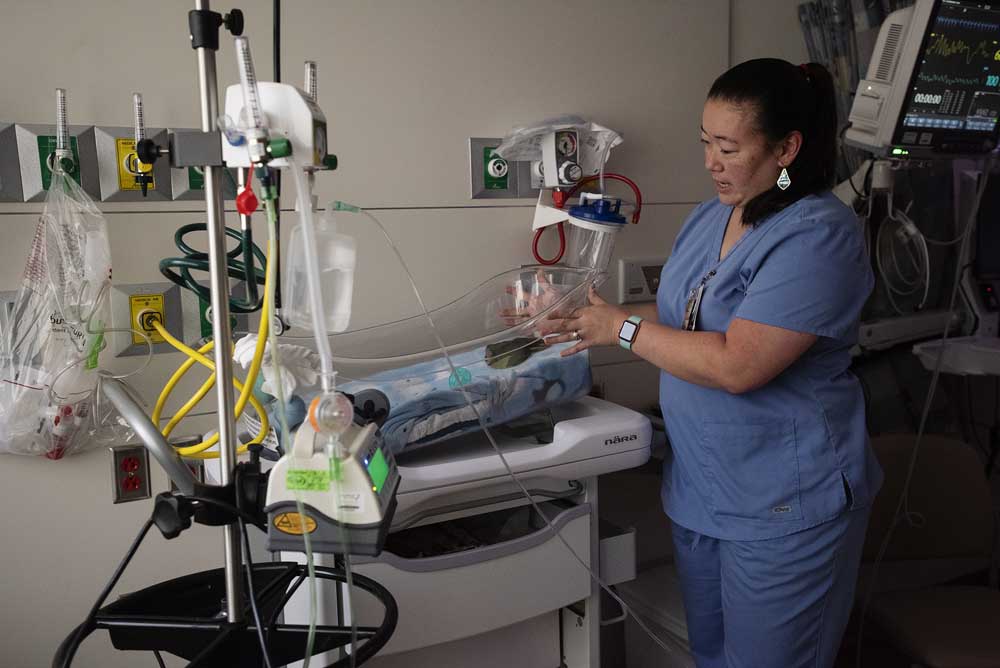Empowering Mothers: Christus Mother Frances Hospitals focus on maternal and infant health with expanded NICU, TexasAIM and breastfeeding policies
Published 10:30 pm Saturday, June 8, 2019

- NICU and Pediatrics Team Lead Jamie Morrison shows how new cribs at the Christus Mother Frances Hospital — Tyler Lucy and John Carr Neonatal Intensive Care Unit (NICU) have be raised to different heights and the angles. (Sarah A. Miller/Tyler Morning Telegraph)
In May, Christus Mother Frances Hospital-Tyler opened its expanded Lucy and John Carr Neonatal Intensive Care Unit at the Louise Ornelas Center for Mothers and Babies. The NICU is a center that cares for infants that are born premature or who need medical attention.
The NICU at Christus Mother Frances Hospital-Tyler is the only Level III facility in Smith County. That means that a doctor or nurse practitioner is always in the building. There is also extra support on hand including physical therapists, lactation support and child life specialists.
About 3,000 babies are born in the hospital each year and about 450 receive intensive care. Many of the babies in the unit are born premature.
The NICU was expanded to include new technology as well as 28 private patient rooms with advanced light and sound control systems to create a more soothing environment. There are new overnight accommodations for parents, as well as double-capacity private rooms that allow twins to stay together.
Craig and Cynda Blankenship, of Longview, have loved their experience in the new NICU. Their son, Crusoe, was born May 28 with unexpected respiratory distress.
Crusoe has been in the NICU for over a week working to strengthen his breathing and is now learning to breastfeed after being taken off a feeding tube.
Craig Blankenship, 30, points out the communications board in their room that allows them to see the names and pictures of the hospital staff who will be caring for his son that day. The board also lists goals for the day, data on Crusoe’s oxygen intake and feedings. There’s even a space to leave messages for the staff.
“I love that I can see who is taking care of us today,” he said.
The Blankenships have visited their son daily after their discharge.
“I have a peace about leaving him here,” said Cynda, 29. “The staff is wonderful.”
Mrs. Blankenship was able to spend the night twice after discharge by using the new rooms that are equipped with beds. She also took advantage of the parents’ lounge that offers a place to recharge and relax. The room has large windows and a refrigerator where parents can bring and keep their own food.
“The capability of rooming in is a huge advantage for parents who live out of town,” said Jamie Morrison, NICU and Pediatrics Team Lead at Christus Mother Frances Hospital – Tyler.
Christus Mother Frances Hospital-Tyler is also in the Texas 10 Step Program. This program encourages mothers to achieve successful breastfeeding before leaving the hospital.
The Department of State Health Services (DSHS) in collaboration with the Texas Hospital Association developed the Texas Ten Step Program in 1999 as a method to improve maternity care practices in birthing facilities. Policy development, education of staff, and provision of discharge resources for breastfeeding mothers are key initiatives of the program.
The program is based on the World Health Organization (WHO)/United Nations Children’s Fund’s (UNICEF) Ten Steps to Successful Breastfeeding, a bundle of evidence-based practices proven to increase breastfeeding exclusivity and duration and reduce racial and ethnic disparities, and is supported by the Texas Medical Association.
The steps in the program include: establishing a breastfeeding policy, staff training, informing parents about the benefits of breastfeeding, skin-to-skin bonding after delivery, providing lactation support, giving babies breastmilk, allowing rooming in for the baby and parents, feeding on cue, no artificial nipples (pacifiers) and offering support and resources.
“We try to utilize breastfeeding first,” Morrison said.
In March, Christus Good Shepherd Medical Center-Longview joined more than 200 Texas hospitals to reduce pregnancy-related deaths and complications through the TexasAIM program.
Sponsored by the Texas Department of State Health Services in collaboration with the Texas Hospital Association and the Alliance for Innovation in Maternal Health (AIM), TexasAIM is a program to reduce the number of deaths due to obstetric hemorrhage, one of the most common causes of death and injury in the days immediately after pregnancy.
Hospitals and medical personnel receive sets of practices and tools called maternal safety bundles that have been shown to make patients safer. The obstetric hemorrhage bundle helps hospitals standardize how they assess women for the risk of hemorrhage, monitor for excessive blood loss and respond in emergency situations.
“Obstetric hemorrhage is one of the leading causes of maternal death, so it is crucial that our caregivers are prepared to treat women who may be at risk or respond effectively when needed in an emergency situation,” said Metosha Brantley, administrative director, Women and Children’s Services, Christus Good Shepherd Health System. “By taking an active role in TexasAIM, we are ensuring that we have the practices, procedures and tools in place to provide lifesaving care for our patients.”
Christus Mother Frances Hospital-Sulphur Springs has also joined TexasAIM.
A future phase of TexasAIM will implement bundles on caring for women with opioid use disorder and treating severe high blood pressure during pregnancy, which are two leading causes of maternal morbidity in Texas.
Also included in the TexasAIM program are four UT Health East Texas Hospitals: UT Health Athens, UT Health Henderson, UT Health Jacksonville and UT Health Tyler. All four of these hospitals are enrolled in TexasAIM and are designated Level 1 neonatal facilities by the Texas Department of State Health Services.
Twitter: @TMT_Sarah






